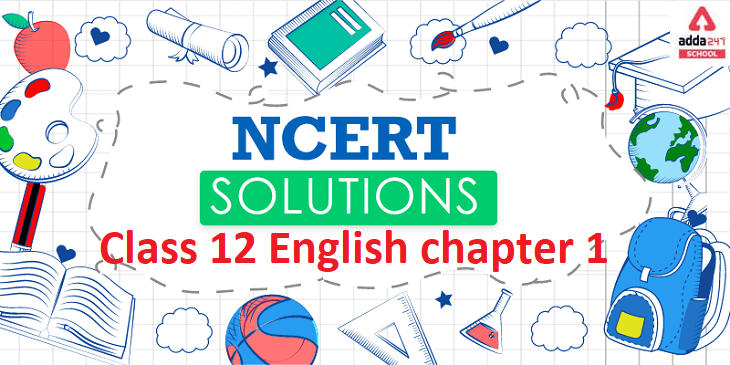NCERT Solutions for Class 12 English Flamingo Chapter 1 The Last Lesson – Introduction
Alphonse Daudet, the author of the final lesson, offers it. In the Last Lesson summary, the author describes what happened in 1870 when Bismarck’s Prussian soldiers captured France. The Alsace and Lorraine regions were also ruled by Prussia. French classes were no longer taught in these two districts. The French instructors were told to leave. M. Hamel was unable to continue attending his old school as a result. Despite this, his final lecture was brimming with commitment and sincerity. One of M. Hamel’s students was terrified of him. When this youngster arrived at school that day, there was a sense that he would receive a penalty. He did discover that this would be his final lesson.
NCERT Solutions for Class 12 English Flamingo Chapter 1 The Last Lesson: Video Explanation
Watch the video given below to better understand the chapter
NCERT Solutions Class 12 English Flamingo Chapter 1 Pdf Download
CLICK Here! To Download Full PDF
NCERT Solutions for Class 12 English Flamingo Chapter 1: Important Question
Q1. The people in this story suddenly realise how precious their language is to them. What shows you this? Why does this happen?
Answer: The French districts of Alsace and Lorraine had fallen into Prussian hands, according to the story. As a result, they received an order from Berlin mandating that only German be taught in Alsace and Lorraine schools. It was at that point that they all realized the importance of their language. The usual commotion at school was replaced by the peace of Sunday church. The students’ sincerity was evident by the fact that they all began working quietly. The only sound in the room was the scratching of pens across the paper. Even the villagers came in and sat quietly as students in the class. Everyone appeared to be depressed. M. Hamel, who was otherwise disliked, instilled in the students a sense of regret. Franz regretted not paying close attention to him, whereas M. Hamel, who was heartbroken at the prospect of leaving, had never explained everything with such patience. He almost seemed to want to tell them everything he knew before leaving. In his words, he adequately captured the mood. ‘We all have a lot of things to be ashamed of.’
Q2. Franz thinks, “Will they make them sing in German, even the pigeons?” What could this mean?
Answer: Franz’s question about whether pigeons can sing in German demonstrates that humans can impose their will on other humans but cannot impose it on nature. It suggests that human power is always limited. They cannot have complete control over the world. Similarly, Prussians can control their schools and learning patterns, but they cannot kill their pride in their country and language.
Talking About The Text:
Q1. “When a people are enslaved, as long as they hold fast to their language it is as if they had the key to their prison.” Can you think of examples in history where a conquered people had their language taken away from them or had a language imposed on them?
Answer: “When people are enslaved, as long as they hold fast to their language it is as if they had the key to their prison.” Examples of conquered people having their language taken away or having a language imposed on them can be found throughout history.
- Imposition of English in India during colonization by Britain.
- Imposition of Chinese in Tibet
- Arabization in North Africa (imposition of Islam and so, imposition of Muslim languages)
- Imposition of French in Britain (Francization)
- Turkish imposed on Kurds
Q2. What happens to a linguistic minority in a state? How do you think they can keep their language alive? For example:
Punjabis in Bangalore
Tamilians in Mumbai
Kannadigas in Delhi
Gujaratis in Kolkata
Answer: In any state, the linguistic minority is easily identified and faces the same discrimination as religious, social, or ethnic minorities. However, there is a significant disparity between the treatment meted out and the level of acceptance displayed by the majority community in that region. Some cities, such as Delhi and Mumbai, have a cosmopolitan outlook.
The linguistic minority attempts to preserve its identity through intimate contact, interaction, and language preservation in social gatherings, family functions, and regional festivals. Adherence to social customs and traditions in family gatherings and women’s meetings fosters unity among members of the linguistic minority. In a nutshell, they have built a mini-Punjab in Bangalore, a mini-Chennai in Mumbai, a mini-Bangalore in Delhi, and a mini-Surat in Kolkata.
Q3. Is it possible to carry pride in one’s language too far? Do you know what ‘linguistic chauvinism’ means?
Answer: People often take quite enough pride in their native tongues and repress others. This is incorrect as we should treat all languages and cultures equally.
Linguistic chauvinism refers to a person’s excessive pride in their native language. Being overly aggressive and fanatical about one’s language is referred to as carrying pride.
Working with words:
Q1. English is a language that contains words from many other languages. This inclusiveness is one of the reasons it is now a world language, For example:
petite – French
kindergarten – German
capital – Latin
democracy – Greek
bazaar – Hindi
Find out the origins of the following words.
tycoon barbecue zero
tulip veranda ski
logo robot trek
bandicoot
Answer:
Tycoon – It originated from the Japanese word “taikun”, which means great lord.
Barbecue – It originated from the Caribbean word “barbacoa”, which refers to a wooden structure used to cook.
Meat – It has Germanic origins.
Zero – The word zero has French origins but it originated from Arabic ‘cipher’.
Tulip – It originated from French but has its origins in Persian dulband means flower shaped turban.
Veranda – It originated from Hindi ‘baranda’ which means railing.
Ski – Norwegian ‘snowshoe’
Logo – It has its origins in Greek logos means ‘imprint’
Robot – It originated from Czech word ‘forced labour’
Trek – South African word means to travel in Dutch
Bandicoot – Telugu word pandikokku, means pig-rat
- Notice the underlined words in these sentences and tick the option that best explains their meaning.
(a) “What a thunderclap these words were to me!”
The words were
(i) loud and clear.
(ii) startling and unexpected.
(iii) pleasant and welcome.
(b) “When a people are enslaved, as long as they hold fast to their language it is as if they had the key to their prison”
It is as if they have the key to the prison as long as they
(i) do not lose their language.
(ii) are attached to their language.
(iii) quickly learn the conqueror’s language.
(c) Don’t go so fast, you will get to your school in plenty of time.
You will get to your school
(i) very late.
(ii) too early.
(iii) early enough.
(d) I never saw him look so tall.
- Hamel
(a) had grown physically taller
(b) seemed very confident
(c) stood on the chair
Answer:
(a) (ii) unexpected and quite startling.
(b) (ii) are attached to their language.
(c) (iii) early enough.
(d) (b) seemed very confident.
Noticing Form:
Read this sentence
- Hamel had said that he would question us on participles. In the sentence above, the verb form “had said” in the first part is used to indicate an “earlier past”. The whole story is narrated in the past. M. Hamel’s “saying” happened earlier than the events in this story. This form of the verb is called the past perfect.
Pick out five sentences from the story with this form of the verb and say why this form has been used.
Answer:
Five sentences in the past perfect tense:
- For the last two years, all our bad news had come from there- the lost battles, the draft, the orders of the commanding officer, I thought to myself. In this sentence, first the information had come and then Franz thought to himself.
- I had counted on the commotion to get to my desk without being seen.
In this sentence, first he got scared and then he tried to get to the desk without being seen.
- I had to open the door and go in before everybody.
In this sentence, he had to open the door before getting in.
- When people are enslaved, as long as they hold fast to their language, it is as if they had key to their prison.
In this sentence, they had their key to prison before they were enslaved.
- But he had the courage to hear every lesson to the very last.
This tense has been used because in the story, the incidents are happening at two different points of time. In this sentence, he had the courage and so, he listened to the lesson to the end.
Writing:
- Write a notice for your school bulletin board. Your notice could be an announcement of a forthcoming event, or a requirement to be fulfilled, or a rule to be followed.
Answer:
NOTICE
ABC Public School
Essay Competition
On 05 – 09 – 2017, the school will host an essay competition. “The Qualities I Admire in My Favorite Teacher” is the topic. All interested students should contact the undersigned by September 2, 2017.
Secretary,
School Literary Club,
Your name
Benefits of NCERT Solutions for Class 12 English Flamingo Chapter 1
In this chapter, the writer Alphonse Daudet has written the story, Last Lesson. The thematic context of the prose deals with patriotism, freedom, and the love for one’s own mother tongue through the story of the Prussian invasion of a French district Alsace and Lorraine.
The entire PDF is made available to you and the answers are written promptly about which you can stay rest assured.
Chapter-wise NCERT Solutions for Class 12 Flamingo
| Chapter 1 – The Last Lesson |
| Chapter 2 – Lost Spring |
| Chapter 3 – Deep Water |
| Chapter 4 – The Rattrap |
| Chapter 5 – Indigo |
| Chapter 6 – Poets and Pancakes |
| Chapter 7 – The Interview |
| Chapter 8 – Going Places |
Chapter-wise NCERT for Class 12 Flamingo Poem Solution
FAQs: NCERT Solutions For Class 12 English Core Book Flamingo Chapter 1: The Last Lesson
- Are solutions for other subjects available as well?
Answer.1) Yes, all subjects catering to the CBSE syllabus and their solutions are available by Adda 247
- How does the NCERT Solutions for Class 12 Flamingo Chapter 1 help you to score efficiently?
Ans.2) The NCERT Solutions for Class 12 English Chapter 1 are prepared in a CBSE specific format to score good marks in the board exam. The solutions created are 100% accurate as per the exam pattern and marks weightage designed by the prescribed board. By using the NCERT Solutions from ADDA 247, students will be able to understand the concepts effectively and score well in the board exams. Students can download the solutions and answer the textbook questions without any difficulty. It also helps students to get their doubts cleared immediately without carrying it for a longer period.
- Does the NCERT Solutions for Class 12 Flamingo Chapter 1 strictly adhere to the CBSE guidelines?
Ans.3) To score high marks in the board exams students should choose the study material which is completely based on the CBSE guidelines. The syllabus for the CBSE board is changed on a regular basis to keep the students updated with the concepts which are important in the current trends. So, the subject experts at Adda 247 provide the NCERT Solutions for all the chapters present in the NCERT textbook. Each and every question is solved in a clear and interactive way to help students score well in the board exams.











 Try CUET College Predictor 2025 to Predi...
Try CUET College Predictor 2025 to Predi...
 CUET Result 2025 OUT (Today) @cuet.nta.n...
CUET Result 2025 OUT (Today) @cuet.nta.n...
 Why the Delay in CUET UG 2025 Results? C...
Why the Delay in CUET UG 2025 Results? C...

